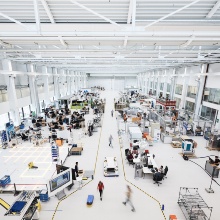As part of a cooperation project with Nokia and Fraunhofer IPA, the University of Stuttgart and its research campus ARENA2036 are setting new quality standards for research infrastructure with the 5G wireless standard. The ARENA2036 research complex operated by the University of Stuttgart is the first university research building in Baden-Württemberg to be equipped with 5G infrastructure which is available to all research partners.
The testing ground, which was developed using Nokia technology, has had 5G technology in place since June 2020. The network operates at a frequency of 3800 MHz, and covers more than 4000 m² of floor space as well as an adjoining outdoor area. This means that applications can be tested both indoors and outdoors. This also makes it possible to move from one site to another without interrupting the connection – a key requirement for many applications.
Pioneering role of the University of Stuttgart
The infrastructure will enable a number of research projects in the areas of Industry 4.0, modern production technology, distributed systems, communications technology and mobile autonomous systems. The cooperation project, which is set to last for a period of four years, began in October 2020. Nokia will continuously develop and optimize the 5G network together with the cooperation partners, in keeping with the requirements of industrial applications.
“5G technology offers a number of benefits to a wide range of private and commercial applications. ARENA2036 now provides the best conditions for cooperative research in this area. I’m excited to see all the new developments that will be created here thanks to the 5G technology”, said Theresia Bauer, Minister for Science, Research and the Arts of Baden-Württemberg.
Prof. Wolfram Ressel, Rector of the University of Stuttgart, spoke of the pioneering role played by the University of Stuttgart in the field of 5G application research with regard to the new infrastructure at the ARENA2036 research facility, and emphasized: “The new 5G infrastructure gives the site a major advantage. It makes it possible to concentrate all kinds of research activities in one place, which should produce synergy effects that will enable significant advances to be made in basic research. At the same time, the intensive exchange with industry partners at ARENA2036 promises a lot of transfer potential, which means that theory will quickly be put into practice and then ultimately be used by the general public.”
5G technology supports research
The project partners have two main goals in particular. Firstly, the 5G infrastructure should make it possible to realize industrial applications which were previously only possible using wires or with major restrictions in terms of mobility and flexibility. Secondly, other new approaches and applications should be tested in coordination with the various actors involved.
Participants are focusing on areas such as research into new approaches for indoor localization with 5G technology, mobile video applications with a high data rate, analysis of technological limits with regard to their use in industrial environments, the real-time configuration of production systems as well as applications with high safety requirements, for example for advanced human-robot collaboration systems.
Jochen Apel, Vice President Global Transportation, Logistics and Manufacturing at Nokia explains: “ARENA 2036 is a ground breaking project for further digitalization and therefore also for the competitiveness of industry in Germany. In this context 5G is an important key to achieving higher productivity, and the ARENA2036 is where we want to work together with the University of Stuttgart, Fraunhofer IPA and industry partners to find out which doors we can open with that key.”
Cooperation partners rely on synergy effects
The cooperation partners are also planning to work with other players in order to develop the 5G infrastructure in such a way that it will exploit synergy effects and visibly strengthen the pioneering work being done. The plan is also to work with the transfer centre 5G4KMU belonging to Fraunhofer IPA, which is also currently building a 5G test bed with support from the Baden-Württemberg Ministry of Economics, and which is trying to promote the use of 5G systems among small and medium-sized businesses.
“5G is essential for the architecture of future production systems. With the 5G test bed in the ARENA2036 we now have the chance to work together to research and develop new systems in the automotive sector”, says Prof. Thomas Bauernhansl, Head of the Fraunhofer Institute for Manufacturing Engineering and Automation (IPA).
In order to be able to continue operating the facility after the end of the project, a concept is being developed by the research coordination team at ARENA2036 to ensure that the initial investment remains usable as existing infrastructure.
Expert Contact:
Dr. Philipp Weißgraeber, Research Coordinator at ARENA2036, tel.: +49 160 34 18 624, e-mail
Bernhard Fuckert, Press Spokesperson at Nokia, tel.: +49 162 28 36 967, e-mail
Matthias Schneider, 5G4KMU Transfer Centre Fraunhofer IPA, tel.: +49 711 970-658, e-mail


